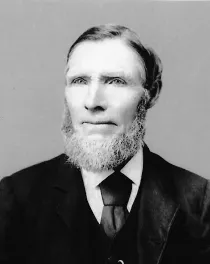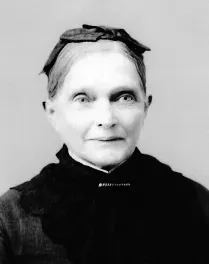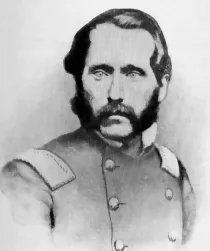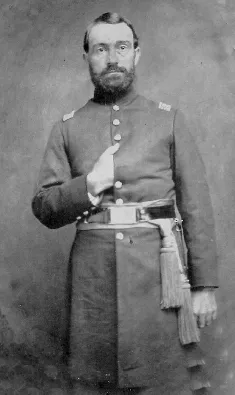![]()
CHAPTER 1
Drum and Fife
September–December 1861
It is because I loved my home so dear
that I left it.
In May 1832 Benjamin Montaigne King, accompanied by his pregnant wife, Martha, and toddler son, Henry, completed a six-hundred-mile trek from New York State to Michigan Territory. The young pioneer family had journeyed west to embrace the adventure and opportunity of the frontier. Benjamin was intercepted by soldiers at Jonesville, Michigan, and drafted to serve one month in the Black Hawk War. Martha spent a seeming eternity isolated in a log cabin with her young son, expecting hostile Indians to overrun her little home at any moment. Benjamin returned from his mercifully uneventful conscription unscathed, and the emergency passed. The Kings settled down at the future site of Eschol, and Benjamin rented a room to labor as a cobbler, pursuing the trade he had apprenticed for as a teen in New York. In 1834 the Kings relocated to Three Rivers, where they occupied the first house built in that town. In the following year, Benjamin built a new home for his family, and a year later the native New Yorker purchased from the government 120 acres of land southwest of Three Rivers. For years he spent the days clearing farmland while devoting his evenings to shoemaking.1
The Kings were descended from Clement King, an Englishman who crossed the ocean and became constable of Marshfield, Massachusetts, in 1668. Also counted among the King ancestors was Johannes de La Montanye, a French doctor born about 1595 and educated in medicine at Leiden University. Montanye later settled in America and was appointed vice director of the colony of New Netherland in 1656.2
Benjamin and Martha raised their family in the near-wilderness of southwestern Michigan. John was born in September 1832; Eunice in 1840. On August 13, 1842, Martha gave birth to James Wood King. Two years later, the birth of James’s sister Martha Rebecca, as fate would have it, completed the family. Martha, the pretty wife who had followed her husband deep into the frontier, died in 1846, shy of her fortieth birthday. Two years after that, Benjamin remarried, to Eliza Van Buren, a cousin of President Martin Van Buren.3
In 1859 Benjamin had a brick house constructed on his farm, which was now part of the township of Fabius. James King’s friend and former schoolmate, Charles Rice, performed the construction, while James hauled the brick and mortar.4 James had worked summers on the family farm, starting around the age of ten, and attended school during winters through the age of sixteen, at which time he became an assistant teacher at the school in nearby Lockport. “He spent hours on Webster’s Elementary Speller,” noted a biographical album of St. Joseph County, “where his companions spent minutes. It was the same in penmanship, reading, arithmetic and grammar … which enabled him to become thoroughly familiar with whatever subject he had at hand.” A determined young man, James was described by one friend as “one of the last to quit in any contest.”5
James grew close to schoolmate Sarah Jane Babcock (“Jenny” to her friends), and the two teens fell in love even as their country began to disintegrate over the issue of slavery. Jenny, born on December 12, 1844, was the daughter of Darius Ambrose and Ruth Butler (Blodgett) Babcock, who immigrated to Michigan by 1840. In addition to four living siblings, Jenny was blessed with about eighty first cousins on the prolific Blodgett side of the family. Three of her great-grandfathers and two of her great-great-grandfathers had fought against the crown in the Revolutionary War, and one of these soldiers from each side of her family held a seat in Connecticut’s House of Representatives in 1781.6 Her grandfather Ezra Blodgett was a descendant of Mayflower Pilgrims John and Priscilla (Mullins) Alden. Through Ezra’s wife, Clarissa, Jenny was descended from England’s King Edward III.7
When the Confederates fired on Fort Sumter on April 12, 1861, a wave of indignation and patriotism swept the North, and Michigan was no exception. Benjamin King by this time was a known antislavery man, and when recruiting rallies sprang up throughout St. Joseph County, his son James enlisted in the St. Joseph County Guard. James surely went off to war mindful of his father’s namesake, their Revolutionary War ancestor Benjamin Montanye. Montanye, who served as a post rider for George Washington, had ridden into capture near the end of the Revolution while carrying correspondence that was purportedly spurious and intended for British eyes—specifically, letters crafted by General Washington to deceive the British regarding his intentions for the military campaign of 1781. Montanye’s descendants, including the Kings, maintained that their forefather’s deception helped secure independence by enabling the decisive victory at Yorktown. To James, his revered great-grandfather was a role model whose example proved that one brave man could impact the course of a great war.8
Darius Ambrose Babcock. (Author’s collection)
Ruth Butler (Blodgett) Babcock. (Author’s collection)
The federal and state governments were unprepared for the overwhelming response they received to the call for volunteers, and as a result it was not until August 24, 1861, shortly after James’s nineteenth birthday, that he and the rest of his nascent military unit—destined to become Company A of the 11th Michigan Volunteer Infantry—gathered at the courthouse in Centreville, Michigan, to muster into what was initially known as Colonel May’s Independent Regiment.9 The raw recruits proceeded to the regimental rendezvous point, Camp Tilden, at the outskirts of White Pigeon.10 A respected lawyer from Sturgis by the name of William Lewis Stoughton drilled the men. The regiment voted for its officers and unanimously selected William J. May as colonel, with Stoughton appointed lieutenant colonel.11
On September 8 Private James King, enjoying a brief furlough at home, sat down and penned his first letter to Sarah Jane Babcock. His initial correspondence exudes the enthusiasm of a raw recruit experiencing military life for the first time, yet something else is conspicuously absent. Though James and Jenny had professed their love for each other less than one year prior, there is little hint of the young romance at first. Subsequent letters reveal that they were both fearful that others might read their correspondence. As the weeks pass, James’s tone relaxes, and it gradually becomes apparent that there is more going on here than just friendship.
__________
Fabius, Michigan,
September 8, 1861
Dear Jenny, you may perhaps think strange of my not coming to see you as I agreed when I last saw you, but circumstances would not permit. I probably shall return once or twice again, and then I will try to put my promise in execution. So far a soldier’s life is better than I expected, but I expect the worst is to come. Well, let it come, I am prepared for it. I do not suppose I can tell you anything about our doings at White Pigeon that would interest you. Probably Odd has related the whole narrative.12 Our fare is not any of the best, but it will not do to grumble. We may get a great deal worse. Men who enlist cannot expect to find home in camp. If they do, they are very much mistaken. I am going to White Pigeon this morning. About sixty of the Three Rivers company go with us.13 I have many acquaintances in that company, many who are good boys, and it will be quite a pleasure to have them with us. The camp has many attractions, but I think I should prefer the steady quiet of home if I could take my choice. I cannot write any more at present, but remember an ever true friend. JK.
William Lewis Stoughton. (Gracie, The Truth about Chickamauga)
Camp Tilden,
White Pigeon, Michigan,
September 17, 1861
Dear Jenny, we are not to leave White Pigeon [for] several days. Upon our arrival here, we found that orders had been given for eighty of our men to volunteer [to leave the regiment], or if they did not, the whole regiment was to [disband], but before our arrival the number had volunteered to go.14 They left us amid cheers and hurrahs. There were none among those who left that you knew. I found Lem [ Jenny’s cousin, Lemuel Pierce] in camp.15 He was out when we left. I have not time to write any more at present. The time for drilling is near at hand, and no one must be absent. Excuse poor writing as our conveniences for writing are poor. But I begin to learn to put up with inconveniences. I think if we do stay here a week [that] I will get a chance to come home, but if I do not, remember him who will ever prove true to you. James W. King.
Camp Tilden,
White Pigeon, Michigan,
September 22, 1861
Dear Jenny, it is the Sabbath morning. I have just returned from breakfast, and having nothing to busy myself at, I thought I might as well write, for perhaps you would like to know what is going on in our camp. The drum and fife is now playing to call the guards together. Every morning, each company is called up and eight or ten men detailed out of each company, then the drum beats to call them together. After all assemble, they are divided into reliefs or companies, with sixteen in a company. These are numbered 1st, 2nd, and 3rd reliefs. Then the first relief is placed on duty. They stay on guard two hours, when they are relieved by the second relief, and so on for twenty-four hours.16 This is the day of writing in our camp. There are four persons writing at the same desk. I do not know who they are writing to, but probably their sweethearts, as they take a great deal of pains and stop to think pretty often. I suppose Lemuel feels better. He has been rather down all the week until he found he could go home, when his spirits revived. Going home had a wondrous effect on him. I should like to have had it tried on me. I heard the col. say yesterday every man should have a chance of going home once more before we leave. If I can get away next Saturday, I am coming home. I received a letter from W. S. Wood. Heard he is encamped near Washington.17 There has been no fighting yet, only a few picket skirmishes. He said the secesh had possession of a peach orchard near the encampment. He took a notion to have some peaches. The boys tried to persuade him not to go, but he thought that peaches were deserving only to the brave, so he mustered around and found two of his companions who volunteered to go with him. They started out, keeping a good lookout for secesh. Upon arriving at the orchard they saw 3 secesh under a tree. They saw Will and his party, and fired at them. Will ordered his boys to lie down and they shot over him, then rising up, they fired on them and drove them out of the orchard, then they filled their haversacks with the delicious fruit and returned to camp uninjured. He says part of the time they live on the fat of the land, part on the lean, but mostly on the lean. I have not time to write any more at present. I probably shall see you again, but if I should not, success be with you is the prayer of him who thinks of you often. James King.
David Oakes Jr. (Courtesy Family of Esther Thompson Hull)
If you direct to White Pigeon in care of Capt. Oakes, write next week for it may be I shall not be home.18
Camp Tilden,
White Pigeon, Michigan,
September 29, 1861
Dear Jenny, it is afternoon and most of our boys have gone to service. There is to be preaching out on the parade ground in front of the quarters, but having some writing to do, and it being rainy and disagreeable out of doors, I preferred to remain in quarters. We have as yet received no orders to leave here. Gov. Blair is coming here on Tuesday.19 I do not know his purpose, but [he] probably will try to get us in the state’s service if we suit him. All of the men who are off on furlough are to be called in by Monday noon on account of his coming. The boys have just come in, and there is now a general rush. All is noise and bustle, I can hardly hear myself think. I left home Thursday morning, remaining at home on Wednesday. I came here on the ten o’clock train and found a deserted camp. Most of our boys had gone to the fair at Centreville. There were hardly enough of our company left for their complement of guards, and of course I had to stand guard. Lem thought he would play up smart, and volunteered to stand with me. We went on Friday morning and remained until Saturday morning at 9 o’clock. About 8 o’clock in the evening, it commenced raining. He thought if he had another chance to volunteer, he would not volunteer at all. Standing guard was not what it was cracked up to be, but fortunately it did not rain very hard, and he felt better. He is playing his tricks on everyone he meets. He has just gone to see if Dixie [Cuthbert Dixon] as he calls him is cheating the boys who is playing cards with him.20 I suppose you may think we have rather a hard set here, and I guess you think right. I think if you would have heard all the oaths I have since I have been writing here, I am afraid you would have a poor opinion of camp life.21 We have had a great many visitors here today, many of them I knew. Among them was C. P. Buck of Lockport, you may perhaps have heard of the gentleman.22 I have just been reading a piece called sunshine at home, and now I should like to read a piece of sunshine in camp, and I think a letter from you would be it. I have not time to write any more as the bugle is now sounding for dress parade, so goodbye Jenny for this time.
Camp Tilden,
White Pigeon,
Michigan, October 4, 1861
Dear Jenny, I have received several letters this week, but yours is the choicest of them all. I should like to have been with you and your mother when you were alone, but that was among the impossibilities. All furloughs were rescinded on Saturday and none given out in expectation that Gov. Blair would be here on Tuesday, but unhappily we were disappointed. Lieut. Col. Stoughton received a letter stating that he would be here on Thursday. Accordingly, at 9 o’clock people began to flock in, and by 2 o’clock in the afternoon quite a large crowd had assembled in expectation of seeing the gov. and also to see us drill. 2 o’clock came and with it the train, but no gov. Here we were doomed to disappointment again.23 Miss E. Sutton, her sister, and brother-in-law were here yesterday among the rest who came to see us.24 I did not get a chance to talk much with her. I saw her while in rank and shook hands with her. While at supper, she and her sister came in where we were eating. I asked her what she thought of soldiers’ fare. She thought I could judge better than she. They left last night on the 10 o’clock train for Sturgis. We have as yet received no orders to leave. I cannot tell whether I will get a chance of coming home again or not. If we ...





